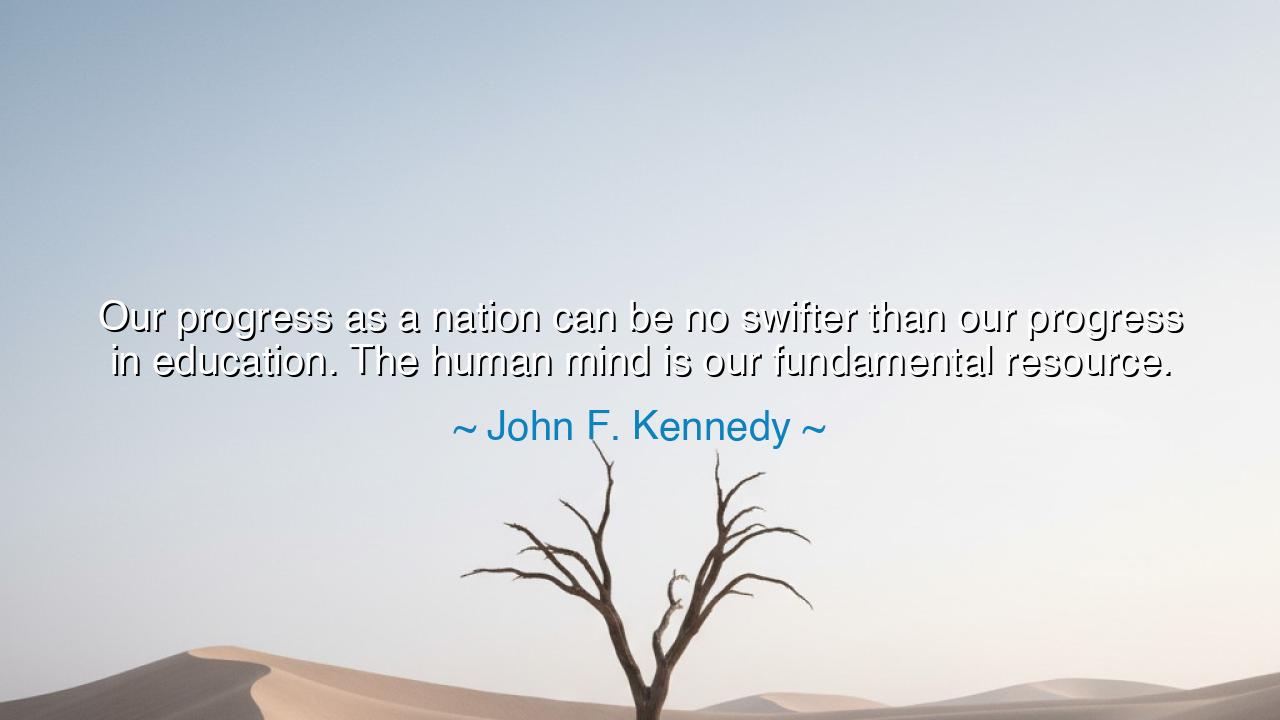
Our progress as a nation can be no swifter than our progress in
Our progress as a nation can be no swifter than our progress in education. The human mind is our fundamental resource.






The great orator and visionary leader John F. Kennedy, whose voice once stirred the conscience of nations, proclaimed: “Our progress as a nation can be no swifter than our progress in education. The human mind is our fundamental resource.” In these words lies the eternal truth that the destiny of a people is shaped not by the wealth of their lands, nor the power of their armies, but by the enlightenment of their minds. Kennedy, speaking in an age of uncertainty and hope, reminded his generation—and all those to come—that the true measure of national strength is the cultivation of wisdom. For the human mind, when nourished by education, becomes the wellspring from which all progress flows.
To understand the origin of this quote, we must look to the early 1960s, a time when the world stood at the crossroads of peril and promise. The Cold War divided humanity between fear and ambition, and a new frontier—the race for space, for knowledge, for technological mastery—had begun. Kennedy, who believed deeply in the spirit of innovation, saw that the survival and advancement of his nation depended not upon weapons, but upon education—upon the intellects of its scientists, the curiosity of its children, and the imagination of its dreamers. It was in this vision that he uttered these words, calling his people to awaken the sleeping power of the mind, that they might rise beyond conflict into the brighter realms of discovery.
His words were not poetic exaggeration, but prophecy. When Kennedy declared that the human mind is our greatest resource, he foresaw the coming age of knowledge—the dawn of the information era, the revolution of science and technology, and the unending need for education to guide them. He knew that nations may exhaust their minerals, their forests, their oil, but the mind of man renews itself endlessly. The more it is used, the greater it becomes; the more it is taught, the more it teaches. Thus, he urged his people to invest in education, for he knew that ignorance is the slow death of nations, while enlightenment is the breath of progress.
To see this truth in life, one need only recall the story of the Apollo Program, born of the very vision Kennedy inspired. When he stood before Congress in 1961 and declared that America would send a man to the moon, many believed it a dream too vast, too daring. Yet behind that dream stood not engines or machines, but minds—the scientists, engineers, and thinkers who had been nurtured by the nation’s schools and universities. Within a single decade, they achieved what no civilization before them had dared. They reached beyond Earth itself, proving Kennedy’s belief that the human mind, when educated and inspired, is the most powerful force in creation. The triumph of Apollo was not merely technological; it was spiritual. It was proof that education is the seed of the impossible.
Kennedy’s words also speak to a deeper truth: that progress without education is a house built on sand. For without wisdom, power becomes destruction; without understanding, wealth becomes corruption. History is filled with empires that crumbled not from lack of strength, but from lack of insight. Rome, once master of the world, fell when its citizens ceased to value learning. Greece, birthplace of philosophy, declined when it turned from thought to pleasure. Kennedy’s message is the antidote to such decline. He warns us that the pace of our progress—our ability to heal, to innovate, to lead—depends entirely on our devotion to learning, to teaching, and to the endless pursuit of truth.
Yet in his wisdom, Kennedy spoke not only to governments but to individuals. For though his voice rang from the podium of power, his message was to every soul who hungered to rise. “The human mind is our fundamental resource,” he said—and so it is with each of us. Your mind is your nation, and your thoughts its citizens. What you choose to feed them—knowledge or ignorance, truth or falsehood—determines the destiny of your own life. Thus, to educate oneself is not merely to read books, but to awaken the sleeping giant within. The mind, once lit with purpose, becomes an inexhaustible source of creation, capable of transforming not only the self but the world.
The lesson, then, is both heroic and humble. If we would see a better world, we must first build better minds. Education is not the concern of teachers alone, but the duty of all who live. Every parent who nurtures curiosity in a child, every citizen who seeks to understand rather than to judge, every leader who invests in schools rather than in war—these are the true builders of civilization. A nation that neglects education weakens the roots of its future; but a nation that honors it grows strong beyond measure, for its wealth is stored not in vaults, but in hearts and minds.
So let the words of John F. Kennedy echo across the ages as a call to all generations: “Our progress as a nation can be no swifter than our progress in education.” Let us remember that every library is a fortress of freedom, every classroom a seed of hope, every student a vessel of tomorrow. The human mind is the engine of destiny; it is the light that guides humanity through darkness. To educate it is to honor life itself. For as long as we continue to learn, to teach, and to dream, the future shall forever remain within our reach.






AAdministratorAdministrator
Welcome, honored guests. Please leave a comment, we will respond soon